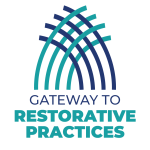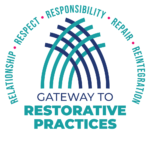Many of you know that I’ve been working on creating a curriculum for an all-day new seminar for quite some time. RP 201 From ACEs to PACEs – Building Restorative Relationships launched on October 21, 2023. Some activities went exactly as planned while others need some improvement. I used more quotes than usual in this seminar because they helped introduce trauma and restorative practices principles. In this blog post I will share some of my favorites.
Restorative Justice Education
At the beginning of the seminar, we introduced the concept of Restorative Justice Education and interconnectedness.
“Being proactive in creating school climates where the well-being of every member is sought requires that restorative justice education facilitators return over and over to the core beliefs of interconnectedness, worth, and the well-being of all participants.”
—Evans and Vaanderling 1, p. 108
Relationships
As we anticipated, some of the participants had participated in a previous restorative practices training, but this was the first training for most. We wanted participants to connect restorative practices immediately to relationships.
“Relationships are at the heart of all we do as educators. Knowing how to build positive relationships with students is a cornerstone skill.” 2
—Chris Werj
Students with Trauma
One of the seminar goals is Take the TRAUMA Out of School Discipline. How can we do this?
“Students learn self-regulation best when they feel connected and safe, and they feel connected and safe when educators focus on building empathy instead of doling out punishment.”3
Sometimes educators focus so much on academics, we forget what students who’ve experienced trauma need.
“When working with trauma-impacted students, we must reach their hearts before we can reach their heads.”4
—Dr. Ken Ginsburg
Support for Adults with ACEs
As expected in a group of 40+ educators, the majority heard about ACEs for the first time. ACEs is an acronym for Adverse Childhood Experiences. Some participants discovered that some of their life-challenges stem from childhood trauma. Although the seminar’s focus is on students, we offered hope to adults who’ve experienced trauma. Here are two special quotes for those of us or those who have family and friends with ACEs.
“The best thing we can do for the children we care for is to manage our own stuff. Adults who’ve resolved their own trauma help kids feel safe.”5
—Donna Jackson Nakazawa
“The main point is this: No matter how old you are – or how old your child may be, there are scientifically supported and relatively simple steps that you can take to reboot the brain, create new pathways that promote healing, and come back to who it is you were meant to be.”5
— Donna Jackson Nakazawa
Beyond an ACEs Score

The next quote is by the same author who wrote the two previous quotes. For those participants
just discovering they have ACEs indicators, they need more than just a score. Donna Jackson Nakazawa is the author of Childhood Disrupted: How Your Biography Becomes Your Biology, and How You Can Heal (2016). Even though her book was published several years ago, I discovered it through my research for this new seminar. I just purchased the book for myself. In a future blog post, I will share about Nakazawa’s book. Her quote follows.
“Learning about ACEs is a start but sometimes we need more. Many people with ACEs have never had their pain validated. Understanding that there exists a biological connection between what they experienced in childhood, and the physical and mental health issues they face now, can help set them on a healing path, where they begin to find new ways to take care of themselves, and begin new healing modalities.” 5
—Donna Jackson Nakazawa, p. 2
Learn More About ACEs
Handouts: Understanding ACEs & Parenting to Prevent & Heal ACEs. Natalie Audage, October 10, 2018. https://www.pacesconnection.com/blog/flyers-understanding-aces-and-parenting-to-prevent-and-heal-aces
Preventing Adverse Childhood Experiences (ACEs): Leveraging the Best Available Evidence. Bethell C, Jones J, Gombojav N, Linkenbach J, Sege R. Positive Childhood
Experiences and Adult Mental and Relational Health in a Statewide Sample: Associations Across Adverse Childhood Experiences Levels. JAMA Pediatrician. 2019;173(11):e193007. doi:10.1001/jamapediatrics.2019.3007
Sources
Restorative Justice in Education: Fostering Responsibility, Healing, and Hope in Schools. Katherine Evans and Dorothy Vaanderling, NY: Good Books, 2016, 2022.
6 Keys to Connecting with the Disconnected. Chris Wejr, March 9, 2016. http://chriswejr.com/2016/03/09/6-keys-to-connecting-with-the-disconnected/
Create a Restorative School Culture. Nathan Maynard, slide 16. https://www.iirp.edu/images/conf_downloads/Xezadm_Creating_a_Culture_of_RP-_IIRP.pdf
ACEs, School Climate and Restorative Practices: What are the Connections and What Do These Look Like in Practice? Permission granted from Jo Ann Freiberg, Ph.D. and Patricia A. Ciccone, C.A.G.S., L. P.C. August 2023. schoolclimateconsultants.com
Parenting to Prevent and Heal ACEs, Donna Jackson Nakazawa, PACES Connection, no date, pp. 1; 2. https://www.pacesconnection.com/ws/ParentingPreventACEs-English.pdf
Image: Opportunity and Achievement Restorative Practices [https://www.mpsaz.org]
Image: heart-love-sunset-the-sun-sky-shape-34959 [pickpik.com]

